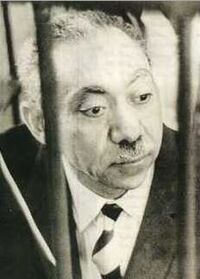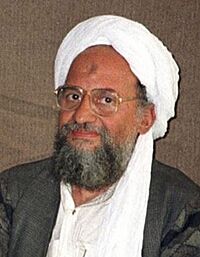Qutbism facts for kids
Qutbism is a name given to the ideas and beliefs of Sayyid Qutb. He was an important leader in the Muslim Brotherhood, a group that wanted to see Islamic governments. Sayyid Qutb was executed in Egypt in 1966.
His ideas were influenced by earlier thinkers like Hasan al-Banna and Maududi. Qutbism suggests using armed struggle, called Jihad, to create an Islamic government. It also supports spreading these ideas through a type of Jihad that goes beyond defending Muslim lands.
Sayyid Qutb's writings have had a big impact on many groups that believe in Jihad around the world. Famous figures like Abdullah Azzam, Osama bin Laden, Ayman al-Zawahiri, and Saif al-Adel were influenced by Qutbism. Its ideas have also been used by the Salafi-jihadist group known as the Islamic State. Some even say it inspired Ruhollah Khomeini to create his own version of these ideas, called Khomeinism.
Many groups that believe in Jihad since the 1970s have been influenced by Qutb's writings. These include the Egyptian Islamic Jihad, Jama'ah al-Islamiyya, al-Takfir wal Hijra, Armed Islamic Group of Algeria (GIA), LIFG, Al-Qaeda, Al-Nusra Front, and the Islamic State. All these groups have tried to use armed Jihad to achieve their goals.
Contents
What Does Qutbism Mean?
People who follow Qutb's ideas are sometimes called Qutbists or Qutbiyyun. However, they usually don't use these names for themselves. The name "Qutbism" was first used by people who disagreed with Sayyid Qutb's ideas. It's like a nickname given by others, not a name they chose for themselves.
Main Ideas of Qutbism
A main idea in Qutbism is the belief that many modern Muslims have moved away from what they see as "true Islam." They believe that people have gone back to a state of ignorance, called jahiliyyah. Followers of Qutbism believe that true Islam must be brought back by them.
Sayyid Qutb wrote down his religious and political ideas in his book Ma'alim fi-l-Tariq, which means "Milestones." Some important ideas from Qutbism include:
- Following Sharia law. They believe Sharia is a holy law from God that humans can understand. Without it, they think true Islam cannot exist.
- Believing that Sharia is a complete way of life. They think it brings not only fairness but also peace, calm, new discoveries, and freedom.
- Staying away from Western and non-Islamic influences. They see these as harmful. This includes ideas like socialism, nationalism, and too much focus on buying things (consumerist capitalism).
- Being careful about what they see as plots by Western and Jewish groups against Islam.
- Using two main ways to achieve their goals:
- Preaching to convince people to join their beliefs.
- Using Jihad to forcefully remove the "structures" of Jahiliyya.
- Believing in a type of Jihad that aims to remove Jahiliyya not just from Muslim lands but from everywhere on Earth. They see this as necessary because they believe Jahiliyya cannot exist with true Islam.
How Qutb's Ideas Spread
The Journey of Qutb's Ideas
Qutb's ideas spread through his books, his followers, and especially his brother, Muhammad Qutb. Muhammad was involved in plots that led to Sayyid Qutb's execution, but he was not given the death penalty. After he was released from prison, Muhammad moved to Saudi Arabia. There, he became a professor of Islamic Studies. He also edited, published, and helped spread his brother Sayyid's writings.
One of Qutb's important students was Ayman Al-Zawahiri. He later became a member of the Egyptian Islamic Jihad. He also became a mentor to Osama bin Laden and a key leader in al-Qaeda. Zawahiri first learned about Sayyid Qutb from his uncle, Mafouz Azzam. His uncle was a close friend of Qutb and taught Zawahiri that Qutb was an honorable man. Zawahiri praised Qutb in his own book, Knights under the Prophet's Banner.
Qutbism was also spread by Abdullah Azzam during the Afghan-Soviet War. During this war, Muslim volunteers from different countries shared their religious ideas. Qutbism mixed with other Islamic beliefs like Salafism and Wahhabism. This led to the creation of Salafi jihadism. Abdullah Azzam was also a mentor to Osama bin Laden.
Osama bin Laden reportedly went to weekly public talks by Muhammad Qutb at King Abdulaziz University. He is said to have read Sayyid Qutb's books and been greatly influenced by them.
The Yemeni Al Qaeda leader Anwar al-Awlaki also said that Qutb's writings helped shape his own beliefs.
Many people who believe in extreme Islamic views see Qutb as a founder of their movement. Ayman al-Zawahiri, who used to lead al-Qaeda, said that Qutb's execution started "the jihadist fire." He believed it changed the direction of the Islamist movement. It convinced them that calling Muslim governments "non-believers" made those governments important targets.
Disagreement with Qutb's Ideas
After Qutb's death, his ideas spread in Egypt and other parts of the Arab and Muslim world. This led to some disagreement from more traditional Muslims. For example, a book called Du'ah, la Qudah ("Preachers, not Judges") was written in 1969. This book was written by Hassan al-Hudaybi, a leader of the Muslim Brotherhood. It argued against the idea of calling other Muslims "non-believers."
Qutb's Thoughts on Different Topics
Science and Learning
Qutb had mixed feelings about science and learning.
He wrote that Muslims should learn science and develop their skills. He believed this would help them fulfill their role as representatives of God. He encouraged Muslims to seek knowledge in abstract sciences and arts. This included learning from both Muslim and non-Muslim teachers. He wanted Muslim communities to have their own experts.
However, Qutb also believed that Muslims should not study some subjects. These included:
- The basic ideas of economics and politics.
- How historical events are explained.
- The beginning of the universe.
- The origin of human life.
- Philosophy and comparative religion.
- Sociology (except for statistics and observations).
- Darwinist biology (which he felt went beyond its observations without good reason).
He also thought that the time of great scientific discoveries in the West was over. He believed that any new scientific discoveries must follow Sharia law.
Sharia Law and How to Govern
Qutbism teaches that in a society based on Sharia law, there would be amazing justice, wealth, peace, and harmony. They believe these good things would happen not just in the afterlife but also in this world.
Qutb believed that the harmony and perfection brought by Sharia law were so great that using a type of Jihad to spread Sharia-Islam around the non-Muslim world was not an attack. Instead, he saw it as a way to bring "true freedom" to people. Because Sharia law is judged by God and not by humans, in this view, enforcing Sharia frees people from serving each other.
In other writings, Qutb described the ruler of an Islamic state. He said this ruler must be a man. The ruler gets his right to rule by being chosen by the community. He also must obey God. The ruler has no special privileges over other Muslims. People should only obey him as long as he follows Sharia law himself.
Views on the West
Qutb believed that Western Imperialism was not just about money or power. He thought it was an attempt to weaken the faith of Muslims. He believed that historians sometimes lied to confuse Muslims and make their faith weaker. For example, he thought they lied by teaching that the Crusades were just an attempt by Christians to take back holy lands. He believed the real goal of these efforts was to destroy Muslim society.
 | DeHart Hubbard |
 | Wilma Rudolph |
 | Jesse Owens |
 | Jackie Joyner-Kersee |
 | Major Taylor |



